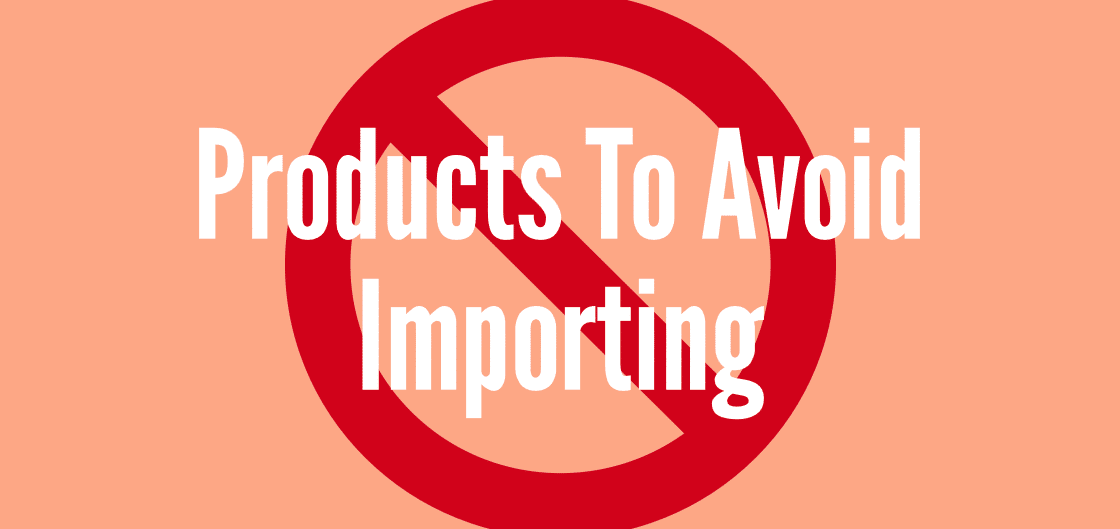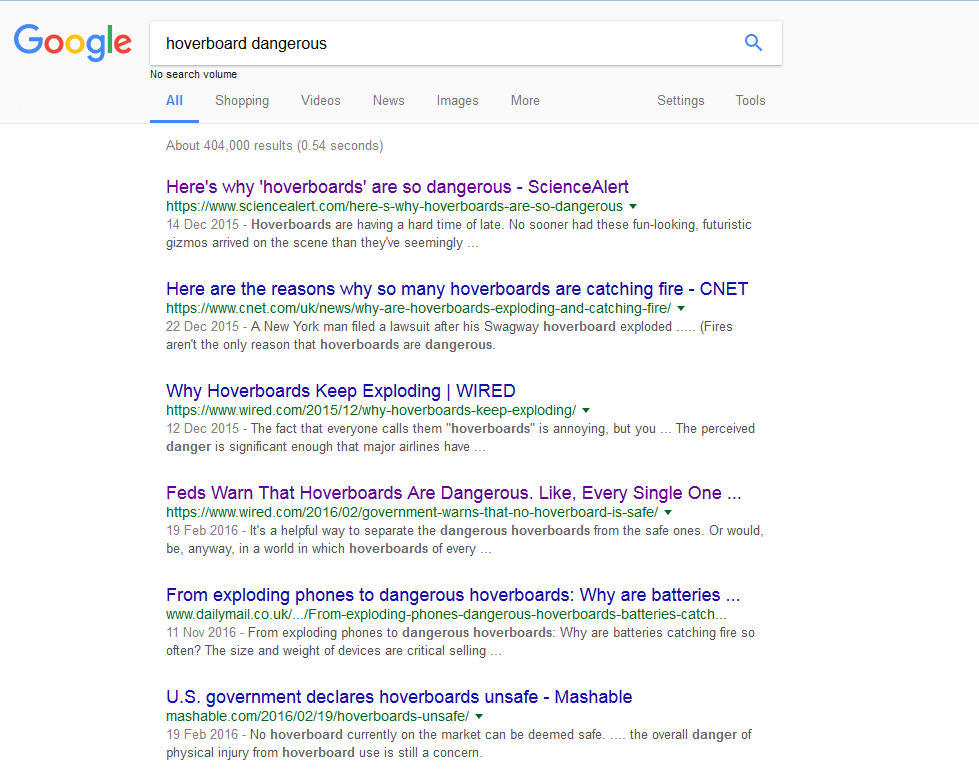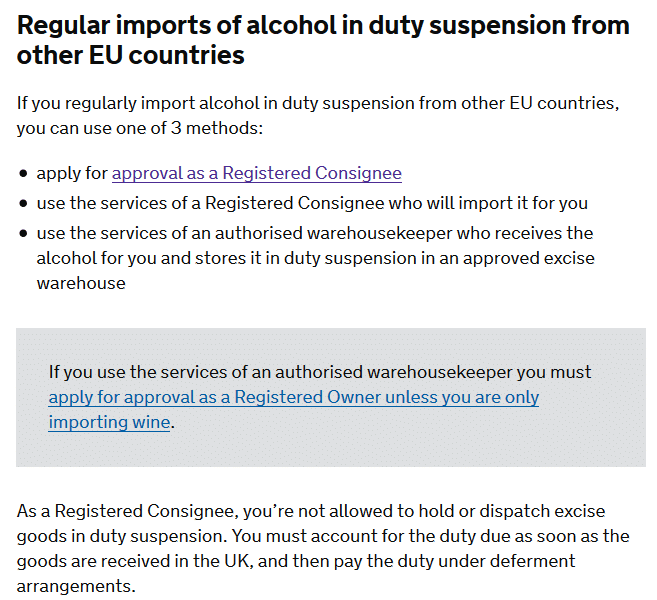When you want to start up an importing business, you can start researching suppliers, marketing and the rest of the good stuff that comes afterwards – but first, you need to choose a product. We’ve already touched on good things to import with our list of 50 ideas for things to import and sell in the UK, but how about products to avoid importing?
Today, we’re going to be talking about the types of goods that are more difficult to import – the type of goods that first-time importers – or people just looking to make a supplementary income as opposed to being dead-set on selling a particular item – may want to avoid.
To help you dodge goods that can’t pass UK Customs we’ve curated a list of goods that you should avoid – or be very careful about importing.
This list is based on our experiences assisting people to import goods; due to this, we’re looking at goods that we’d recommend avoiding because they’re difficult to import and clear through UK Customs. While there are some goods that you may want to avoid importing due to quality differences and customer satisfaction, this list doesn’t include them. For more information on how to control quality when importing, feel free to read out post: Controlling Quality Issues When Importing From China.
There are two different types of products that we’re going to talk about.
- Goods that are just a pain in the backside when it comes to Customs
- The 9 Classes of Dangerous Goods
-
Items Customs (Probably) Hate
We wouldn’t typically say there are items you “shouldn’t” import – just items that you’ll have to be extra careful when importing. A lot of products that fall into these categories are logical when you consider what the purpose of UK Customs is; to protect the UK and stop dangerous or harmful goods from entering the market. This can mean the goods are dangerous to the health of the UK population, or even dangerous to the UK market/economy (which is why anti-dumping duties exist). Here are a few products to be wary of:
1. Dodgy Rechargeable Electronics
YOU CAN IMPORT THESE (not the dodgy ones)!
As long as you know what documentation you need, we can help you to import electronics. If you aren’t 100% sure on the documentation you need, feel free to contact us or better still, Trading Standards, to help you figure it out.First of all, rechargeable electronics will be subject to scrutiny by Trading Standards due to the tendency that badly wired electronic goods can be . . . well, dangerous. They can start fires, electrocute people and just generally get you into trouble.
Essentially, all Customs and Trading Standards are there for is our protection and their job is to stop faulty or dangerous goods from entering the country, so anything that’s slightly higher risk will be flagged and is more likely to be checked.
Make sure you have test reports and certification that the goods you want to ship are safe for the UK market before buying them. Your local Trading Standards are a good place to start by asking what documents you need in place.
2. Hoverboards
Hoverboards are especially difficult to import – regardless of if everything is perfect with the documentation, hoverboards are still incredibly likely to be stopped by Customs. Unfortunately, there’s nothing you can do about it. Why? Well…
UK Customs are hot on these and for good reason; imported hoverboards have been known to catch fire. As you can see above, hoverboards don’t have a great history. If you do import them, regardless of your supplier’s compliance and testing certificates, your goods will be stringently inspected by Customs. This item is high up on our “steer clear” list.
3. Food
Once again, when you think about it, it’s logical for food items to be more difficult to import – food is ingested and, if it’s unsafe, that’s a massive health risk. The same goes for products that touch food, if they have any unsafe properties, they can pass their properties on.
When you import food, there is a lot of documentation and precautions that need to be taken; sometimes (depending on the type of food or food-related product you’re importing) you’ll even need to make sure that your goods are sent to specific ports! This is because, although all ports have some form of Trading Standards body, there are many different branches and more food-specific branches may only be allocated to certain ports.
“Some products can only come into the European Union (EU) through specific ports. For example, animal products (such as meat, dairy foods and fish) can only enter through a port with a Border Inspection Post (BIP). Some other foods that are not of animal origin have similar rules.” – Importing food, Food.gov.uk
If your goods are being imported as Organic, they won’t be allowed in until an official certificate from the country of origin, proving their organic credentials, is stamped by the UK authorities.
All of this means that you’ll need a lot of certification for most types of food. If in doubt, contact Port Health and ask them what you’ll need for your goods.
4. Products that will touch food (such as plastic cutlery, Tupperware)
As above, the issue with products that will touch food is that they can pass on any negative properties to the food, which can then be passed on to anyone ingesting it. Sometimes, products that touch food (such as containers) may be subject to changing conditions like microwaving – so they need to be safe.
Recently customs have been cracking down on any bamboo food related products which contain melamine as this can (in high quantities) be dangerous, specifically, bamboo cups containing melamine have been a product customs are interested in. Therefore the melamine content is required to be disclosed on test documents.
5. Batteries
NOTE
This is not just for loose batteries; if you’re importing goods that have batteries in them, you will still run into the same issues.Electronics with lithium batteries need to be safe for Trading Standards to allow them into the country – but they also need to be safe to be transported. Plenty of manufacturers are able to develop electronic goods to a high enough standard to get into the country, pass Custom’s tests and resell in the UK, however, make sure you have the test reports to prove their safety and more importantly have found a company willing to transport them before you pay your supplier. Batteries can be notoriously difficult and a lot of shipping companies (including us) will refuse to ship certain types.
Batteries fall under hazardous materials (hazmat) regulations depending on type and wattage. They will be considered dangerous goods if:
- wattage/cell is greater than 20 wh, or
- wattage/battery is greater than 100 wh
6. Drugs/Supplements –
(No, not just the illegal type.)
Maybe you stumble across some new organic vitamins that a Chinese supplier is selling unbelievably cheaply and you just know you could make a massive profit off them. This could be OK but make sure you know exactly what documents Port Health in the UK need.
They will likely need ingredients lists and testing documents as they are in a similar category to foods with regards to human consumption.
7. Alcohol & Tobacco
Alcohol and tobacco are two incredibly difficult products to import – not only is there a lot of paperwork required, but the actual process for importing them is different. Although you don’t need a government-issued license to import these products, you do need to become an approved as a Registered Consignee to receive them.
8. Most Consumable Products
Consumable products such as Tea (especially from China) have restrictions to ensure they are safe meaning you often need to register on the TRACES system to import them, this can be time-consuming and you will need to submit certificates and documents from your supplier.
You will also be required to make an account yourself, as not many shipping companies will offer this service – if they do they will charge you.
As a first time importer, all these hoops you’ll need to jump through aren’t complications you particularly want to face.
Save
Save
Save
-
Dangerous Goods
When importing goods, there are different requirements for each product that you’re bringing in to ensure that they can be transported and cleared in the UK.
However, there are some goods that will require a lot more work and attention than others. Dangerous goods are a prime example of this – so be aware of what classifies as dangerous goods and why you need to be careful with them! We’ve already written a post detailing the 9 classes of dangerous goods in detail and sharing with you some of the products in each category, but we’ll include the infographic below.
The reason these products are so difficult to import is two-fold – for one, they’re considered dangerous in normal transit conditions, which means that transporting them the way you would transport normal cargo isn’t possible. Often, there are specific conditions that have to be met for these products (such as refrigerated containers) that are not only more difficult to provide but are also more expensive. As a first-time importer, the importing process can seem daunting enough without adding all the extra hassle.
However, in addition to being difficult to transport, these goods can also pose a security threat to the market, which means that Customs will likely want to test them when they arrive in the UK.
Save
Save
Save
-
Items To Just Never Import
Now, we know that just earlier we said there aren’t products we suggest you never import . . . but we lied. There are some goods that, as a first time importer, it’s just not worth the pain and suffering to try for.
1. Branded goods (if the supplier doesn’t have certification)
We’ve touched on why importing branded goods is bad before – but it mostly hinges on Intellectual property and the fact that importing branded goods is, more often than not, illegal. Unless you have a signed certificate of authorisation from the copyright holder, any goods containing any intellectual property will be destroyed when they reach the UK.
2. Illegal goods
Although obvious, this wouldn’t be a complete list of things you shouldn’t avoid without mentioning that you definitely do not want to import anything illegal. Not only will it get destroyed at the border, you’ll also be facing fines at the very least.
3. Things you need a license for
Last but not least, if you’re a first-time importer, you should definitely avoid importing goods that you need a license for. This is because . . . well, without a license you won’t be able to. As a new importer, it is incredibly unlikely that the government would be willing to issue you a license (in fact, it’s probably closer to impossible) so you won’t be able to import goods that require one.
The bright side to this is that not many products require licenses – think weapons, medicine, animals etc. As a start-up business, you in all likelihood won’t be wanting to import goods that require an import license.Save
Save
Save
-
Contact Shippo For Help & Questions
Hopefully, this post was helpful and provided some insight into the type of goods that may be more trouble than they’re worth to import as a first-timer!
If you have any questions about products we haven’t covered in this guide, please feel free to contact us or get your quote here.
Has been great dealing with the Shippo team for our first import from overseas. Made everything extremely simple and allows us to focus our time and energy on running our business rather than logistics. Definitely recommend.Alexander Lloyd



